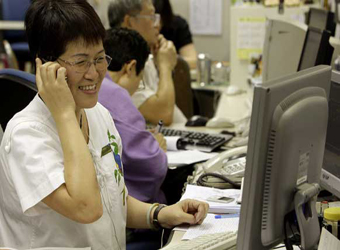Asian stock markets ended mostly higher on Friday’s trade as investors digested the second day of U.S. Federal Reserve Chair Janet Yellen’s testimony ahead of earnings season.
Japan’s Nikkei 225 gained 0.09 percent, or 19.05 points, to close at 20,118.86.
The Kospi advanced 0.21 percent, or 5.14 points, to end at 2,414.63, making gains for a second-straight day after closing at a record level in the last session.
Down Under, the S&P/ASX 200 rose 0.49 percent, or 28.351 points, to close at 5,765.119.
Greater China markets were a mixed picture. Hong Kong’s Hang Seng Index edged up 0.16 percent to hold near two-year highs. Mainland markets recorded declines. The Shanghai Composite rose 0.13 percent, or 4.1473 points, to close at 3,222.3105 and the Shenzhen Composite shed 0.407 percent, or 7.6865 points, to finish at 1,881.0110.
In the U.S., Yellen said Thursday that achieving President Donald Trump’s 3 percent growth target would be “challenging” due to reasons related to productivity growth.
Bond yields dipped after rising overnight. Yields of the 10-year U.S. Treasury stood at 2.34 percent after rising to around 2.35 percent in the previous session. 10-year German Bund yields inched lower to 0.58 percent after hitting 0.6 percent overnight on news of the European Central Bank possibly adjusting its policy outlook.
The Fed’s dovish slant has underpinned optimism among equity investors of late, OANDA Senior Trader Stephen Innes said, adding that U.S. June CPI data due later in the day would be a key metric influencing moves in the dollar next week.
Interest rates will return to the forefront for traders as the Fed “pump(ed) the breaks” on hiking rates, he added.
Additionally, Innes said, traders were turning to carry trades, signalling a greater risk appetite for emerging markets. A carry trade is when investors borrow in a low-yielding currency, such as the yen, to fund investments in higher-yielding assets elsewhere. A weakening currency is central to the carry trade since it means that investors have less to repay when they cash out.
The dollar index, which measures the dollar against a basket of currencies, remained subdued at 95.664 at 4:05 p.m. HK/SIN. The dollar was mostly flat against the yen at 113.24, below a low of 113.28 seen in the last session. The greenback had fetched as high as 114.07 yen earlier in the week.
The Australian dollar continued its upward trend after previously rising on the back of strong China trade data released Thursday. The Aussie dollar last traded at $0.7755, above the $0.76 handle seen earlier this week.
A weak U.S. CPI print could push the pair into $0.78 territory, IG Chief Market Strategist Chris Weston said in a note, citing “general ill-will” towards holding the dollar as one driver of the Aussie dollar.
Oil prices stumbled, with Brent crude futures edging down 0.39 percent to trade at $48.23 a barrel and U.S. crude declining 0.46 percent to trade at $45.87.
Oil prices had risen more than 1 percent in the previous session after China customs data showed strong demand from the world’s second-largest economy. This had offset higher levels of production noted in an International Energy Agency report.
In individual stocks, shares of Korean automakers were in focus following headlines from Yonhap News that unionized Hyundai employees were taking a vote over a potential strike. Results of the strike will be known after the market close.
Hyundai shares closed up 3.36 percent and Kia Motors rose 1.08 percent.
Taiwanese tech shares closed lower despite chipmaker Taiwan Semiconductor Manufacturing (TSMC) forecasting a rise in revenues for the third quarter. Meanwhile, optical lens supplier Largan Precision reported a fall in quarterly net income, according to local media.
TMSC shares were down 0.7 percent and Largan fell 3.09 percent.
In economic news, Singapore’s economy grew 0.4 percent in the second quarter compared to the previous quarter, below a forecast of 1.1 percent from a Reuters survey. The figure reflected a 2.5 percent rise on year, compared to the 2.8 percent expected, Reuters added.
The dollar gave up some gains against the Singapore dollar to fetch S$1.3742 after trading as high as S$1.3768 earlier in the session following the news.
Japan May industrial production declined 3.6 percent compared to the previous month, but rose 6.5 percent on year, data from the Ministry of Economy, Trade and Industry showed.
In the week ahead, Asia markets are expected pay attention to earnings from the region and out of the U.S.
While local earnings were likely to influence regional markets, the U.S. profit reporting season was certain to help set the tone in the region next week, CMC Markets Chief Market Analyst Ric Spooner said.
“Current full valuations suggest investors are once again expecting U.S. companies to beat analyst forecasts on average,” Spooner said.
On Wall Street, stocks closed slightly higher ahead of earnings season as the Dow Jones industrial average notched a record close.
Source: CNBC


